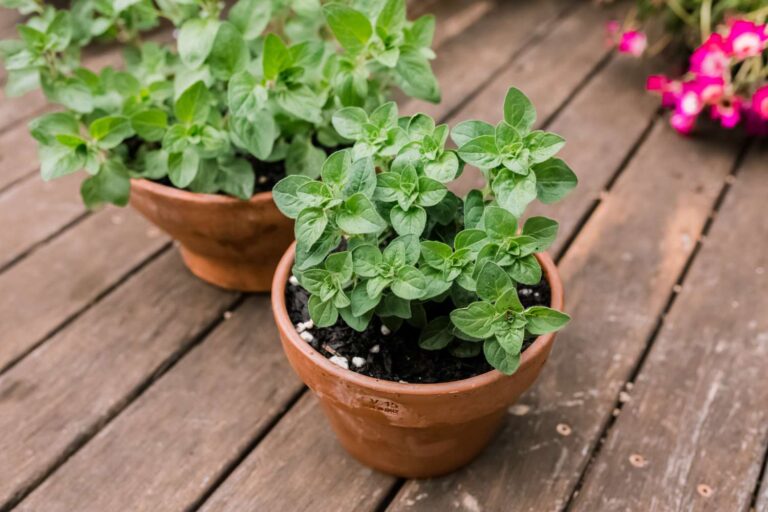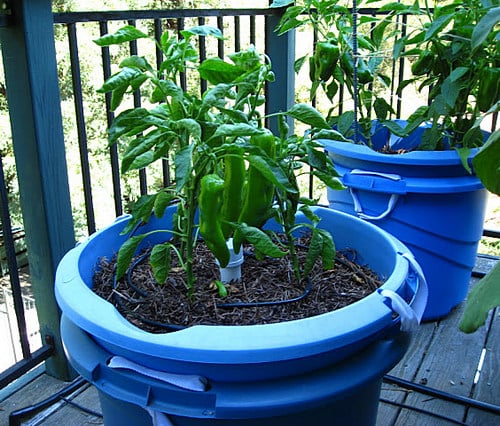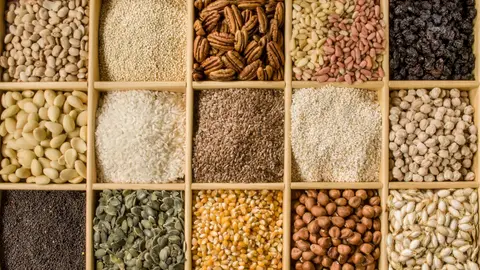Alfalfa Meal: Supercharging Your Soil’s Fertility
Did you know that alfalfa meal can be a game-changer for your garden? It’s a natural and sustainable way to supercharge your soil’s fertility, and it’s gaining popularity among eco-conscious gardeners. But what exactly is alfalfa meal, and how does it work?
Alfalfa meal is a type of organic fertilizer made from ground-up alfalfa plants. It’s rich in nitrogen, phosphorus, and potassium, which are essential nutrients for healthy plant growth. When applied to the soil, alfalfa meal breaks down slowly, releasing these nutrients over time and promoting long-term soil fertility.
But that’s not all. Alfalfa meal also contains beneficial microorganisms that can improve soil structure, increase water retention, and reduce erosion. Plus, it’s a natural pest repellent, making it a win-win for both your plants and the environment.
If you’re looking for a sustainable and effective way to enrich your soil, alfalfa meal is definitely worth considering. Give it a try and see the difference it can make in your garden!
Table of Contents
Benefits of Using Alfalfa Meal in Soil Improvement
Alfalfa meal is a valuable addition to any soil improvement routine, offering a plethora of benefits to gardeners and crop growers. Its use in soil enhancement has gained popularity due to its ability to address various soil deficiencies and promote healthier plant growth.
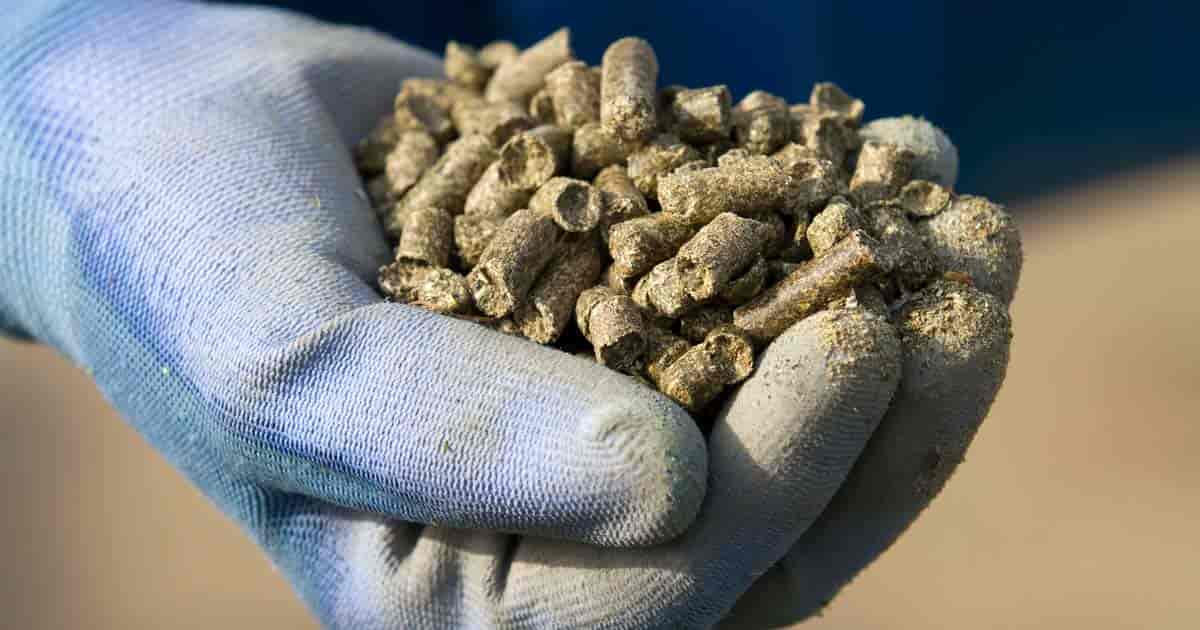
- Alfalfa meal is rich in essential nutrients, including nitrogen, phosphorus, and potassium, crucial for plant development.
- It also contains trace elements such as iron, magnesium, and calcium, vital for proper plant nutrition.
- These nutrients are released slowly over time, providing a sustained source of nourishment for plants.
- Alfalfa meal acts as an effective soil conditioner, improving soil structure.
- Its fibrous nature increases soil porosity, enhancing airflow and drainage.
- Improved soil porosity prevents waterlogged conditions and provides plants with necessary oxygen for metabolic processes.
- The organic matter in alfalfa meal enhances soil aggregation, creating a crumbly and friable soil texture.
- This soil texture is conducive to root penetration and nutrient absorption, promoting optimal root growth and plant health.
Understanding the Nutritional Composition of Alfalfa Meal
Alfalfa meal is a versatile and nutrient-rich soil amendment that has gained popularity among gardening enthusiasts. To fully understand its potential benefits, it is essential to delve into the nutritional composition of this remarkable organic material.

- Alfalfa meal is a high-protein fertilizer with a protein content ranging from 15% to 20%, providing essential nitrogen for plant growth and development.
- Nitrogen from alfalfa meal promotes lush foliage, enhances root development, and boosts overall plant productivity.
- Alfalfa meal contains crucial nutrients like phosphorus, potassium, calcium, iron, and magnesium, supporting vital plant processes such as photosynthesis, enzyme activation, and energy production.
- Its rich organic matter content improves soil structure, increases water holding capacity, and aids in nutrient absorption by plants.
- Decomposing alfalfa meal releases organic compounds that nourish beneficial soil microbes, fostering a healthy and thriving soil ecosystem.
The following table explain about the nutritional composition of Alfalfa Meal:
| Nutrient | Percentage (%) |
|---|---|
| Protein | 15-20 |
| Fiber | 25-30 |
| Calcium | 1.5-2.5 |
| Phosphorus | 0.3-0.5 |
| Potassium | 2.5-3.5 |
| Magnesium | 0.5-0.8 |
| Iron | 300-400 ppm |
| Zinc | 20-30 ppm |
| Copper | 5-10 ppm |
| Manganese | 40-60 ppm |
| Vitamin A | 5000-10000 IU/kg |
| Vitamin D | 500-1000 IU/kg |
| Vitamin E | 20-40 IU/kg |
This, in turn, aids in the breakdown of organic matter and the release of essential nutrients for plant uptake. Ultimately, the nutritional composition of alfalfa meal makes it an ideal choice for enriching soil fertility and promoting robust plant growth.
(Note: The paragraph above contains a brief overview of the nutritional composition of alfalfa meal. Further details on specific nutrient concentrations and ratios can be included in subsequent sections of the article.)
How Alfalfa Meal Boosts Soil Fertility
Alfalfa meal is an excellent natural fertilizer that can greatly enhance soil fertility. Its effectiveness lies in its rich nutrient composition, which includes essential elements such as nitrogen, phosphorus, and potassium. These nutrients are essential for plant growth and play a crucial role in improving soil fertility.
Nitrogen
Nitrogen, a vital nutrient for plants, is found abundantly in alfalfa meal. It is a key component of proteins, enzymes, and chlorophyll, all of which are essential for plant growth and development. By incorporating alfalfa meal into the soil, gardeners can provide a steady and long-lasting supply of nitrogen to their plants, promoting healthy foliage growth and robust root development.
phosphorus
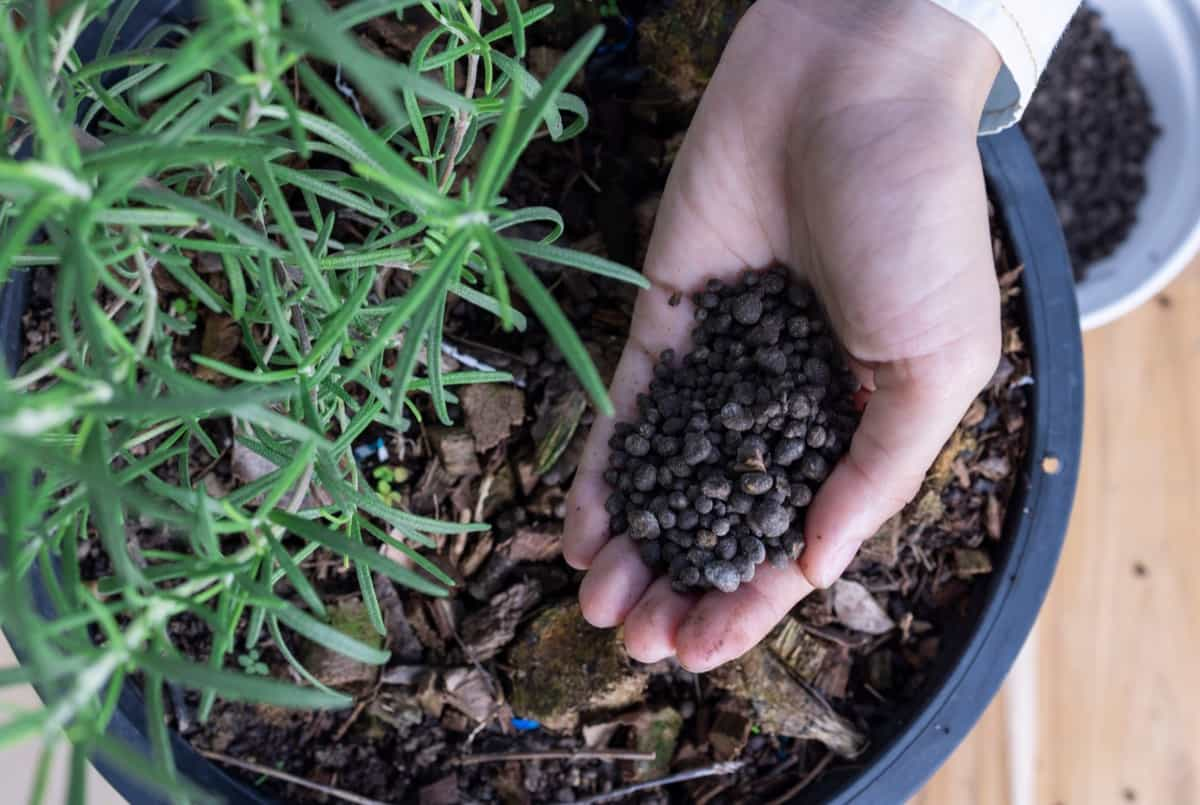
Additionally, alfalfa meal contains significant amounts of phosphorus, a nutrient critical for energy transfer in plants. Phosphorus is involved in several vital plant processes, including photosynthesis, respiration, and the formation of DNA and cell membranes. By adding alfalfa meal to the soil, gardeners can ensure that their plants have access to an adequate supply of phosphorus, ultimately improving their overall health and vitality.
potassium
Furthermore, alfalfa meal is a valuable source of potassium, a nutrient essential for regulating water balance, promoting root development, and strengthening plants against diseases and pests. Potassium helps plants withstand stressors such as drought, excessive heat, and pests, resulting in stronger, healthier plants.
In conclusion, alfalfa meal is a powerful soil amendment that greatly boosts soil fertility. With its high content of essential nutrients such as nitrogen, phosphorus, and potassium, it provides plants with the fuel they need to thrive and flourish. Incorporating alfalfa meal into your soil improvement routine can lead to healthier, more productive plants in your garden.
Enhancing Soil Structure with Alfalfa Meal
Alfalfa meal is a powerhouse when it comes to enhancing soil structure. Its fibrous nature aids in creating a well-drained and porous soil environment, which is crucial for optimum plant growth. When incorporated into the soil, alfalfa meal acts as an effective soil conditioner, promoting soil aggregation and enhancing its overall structure.

- High Organic Matter Content: Alfalfa meal is rich in organic matter, including cellulose and lignin.
- Binding Agent: The organic matter in alfalfa meal acts as a binding agent, forming stable soil aggregates.
- Improved Soil Porosity: These aggregates enhance soil porosity, facilitating better root penetration, water infiltration, and air circulation.
- Enhanced Nutrient Access: Improved soil structure allows plants to access nutrients more effectively, promoting healthier and more vigorous growth.
- Silica Content: Alfalfa meal contains significant amounts of silica.
- Strengthening Plant Tissues: Silica strengthens plant tissues by fortifying cell walls.
- Resilience to Stress: Silica improves plant resilience to stress, diseases, and pests.
- Stronger Root Systems: Enhanced plant health leads to stronger root systems.
- Increased Nutrient Uptake: Stronger roots facilitate increased nutrient uptake.
- Overall Soil Structure Improvement: The presence of silica further contributes to improving soil structure and promoting plant vitality.
By incorporating alfalfa meal into your soil improvement routine, you can harness its ability to enhance soil structure, creating a favorable growing environment for your plants. Improved soil structure not only supports healthier plant growth but also aids in preventing erosion and increasing water-holding capacity, ultimately contributing to the long-term sustainability of your garden or farm.
The Role of Alfalfa Meal in Improving Soil Drainage
Improving soil drainage is crucial for promoting healthy plant growth and preventing waterlogged conditions that can lead to root rot and other issues.
- Introduction of Alfalfa Meal: Alfalfa meal, derived from dried and ground alfalfa plants, is renowned for its soil improvement properties.
- High Organic Matter Content: Alfalfa meal contains significant levels of organic matter.
- Absorption of Excess Water: The organic matter acts as a sponge, absorbing excess water and retaining it until drainage occurs.
- Benefit for Clay Soils: Particularly advantageous for heavy clay soils with poor drainage capabilities.
- Improvement of Soil Structure: Incorporating alfalfa meal improves the structure of clay soils, facilitating better water movement.
- Natural Compounds for Soil Aeration: Alfalfa meal contains natural compounds that aid in soil aeration.
- Breaking up Compacted Soil: These compounds help break up compacted soil, creating channels for water to flow more freely.
- Reduced Compaction: Improved soil aeration reduces soil compaction, allowing for better drainage and root growth.
- Promotion of Healthier Plant Growth: Enhanced soil aeration ensures plants receive the oxygen needed for optimal growth.
- Overall Benefits: The combined effects of high organic matter content and natural compounds in alfalfa meal significantly improve soil drainage, making it an invaluable addition to soil improvement practices for healthier plant growth.
Whether you are dealing with heavy clay soils or simply want to promote healthier plant growth, incorporating alfalfa meal into your soil improvement routine can make a significant difference.
Alfalfa Meal as a Source of Organic Matter for Soil
Alfalfa meal, derived from the dried and ground leaves of the alfalfa plant, is a valuable source of organic matter for soil improvement. Organic matter plays a crucial role in enhancing soil fertility and overall soil health. When incorporated into the soil, alfalfa meal acts as a nutrient-rich amendment, providing essential elements that are necessary for plant growth and development.

Whether you have a vegetable garden, flower beds, or container plants, the addition of alfalfa meal to your soil can have significant positive impacts on both plant health and overall garden productivity.
Improving Soil Aeration with Alfalfa Meal
- Introduction to Alfalfa Meal: Alfalfa meal serves as a natural soil amendment renowned for its ability to enhance soil aeration.
- Importance of Soil Aeration: Soil aeration is crucial for healthy plant growth, facilitating root access to oxygen essential for metabolic processes.
- Consequences of Poor Aeration: Compacted or poorly aerated soil can lead to issues like root rot and nutrient deficiencies, resulting in stunted growth and reduced yields.
- Alfalfa Meal’s Role in Addressing the Issue: Alfalfa meal aids in creating a more porous soil structure, promoting the formation of air pockets within the soil.
- Fibrous Nature of Alfalfa Meal: The fibrous nature of alfalfa meal contributes to better airflow and oxygen exchange within the soil.
- Prevention of Compaction: As alfalfa breaks down, it releases organic matter that binds soil particles together, preventing compaction.
- Benefits of Improved Soil Structure: Enhanced soil structure not only improves aeration but also aids in water infiltration, root penetration, and nutrient distribution.
- Role of Beneficial Soil Organisms: Alfalfa meal serves as a food source for beneficial soil organisms like earthworms.
- Contribution to Soil Aeration: These organisms aid in breaking down organic matter, creating channels for air and water movement, further enhancing soil aeration.
- Overall Benefits of Alfalfa Meal: Incorporating alfalfa meal into soil improvement routines improves soil quality, supports healthier plant growth, and increases yields, fostering long-term sustainability in gardens and farms.
By utilizing this natural amendment, you can create an optimal soil environment that supports robust growth and ensures long-term sustainability. So why not give alfalfa meal a try and experience the remarkable difference it can make in your garden or farm?
Alfalfa Meal’s Contribution to Soil Microbial Activity
Alfalfa meal, with its rich composition of organic matter and essential nutrients, is known to significantly contribute to soil microbial activity. Microbes, such as bacteria, fungi, and other microorganisms, play a crucial role in soil health and fertility, and alfalfa meal provides them with the ideal environment to thrive.
- Alfalfa meal enhances soil microbial activity through its high carbon-to-nitrogen (C:N) ratio, which influences the breakdown of organic matter in the soil.
- The decomposition of alfalfa meal releases carbon, providing an energy source for soil microbes, leading to increased microbial population and metabolic activity.
- Alfalfa meal contains natural compounds like saponins and phytochemicals that stimulate the growth of beneficial bacteria and fungi in the soil.
- Beneficial microbes promoted by alfalfa meal aid in organic matter decomposition, nutrient cycling, and the suppression of harmful pathogens, contributing to a healthier soil ecosystem.
- The carbon-rich nature and microbe-stimulating properties of alfalfa meal make it a valuable resource for gardeners and farmers to enhance soil microbial communities, improve nutrient availability, disease resistance, and overall soil fertility.
So, by using alfalfa meal, gardeners and farmers can harness the power of soil microbes and unlock the full potential of their crops.Stay tuned for the next section, where we will delve into the topic of using alfalfa meal to increase soil water retention.
Using Alfalfa Meal to Increase Soil Water Retention
Increasing soil water retention is a crucial aspect of maintaining healthy and vibrant plant growth. One effective method of achieving this is by incorporating alfalfa meal into your soil improvement routine. Alfalfa meal, derived from the legume crop commonly known as lucerne, offers numerous benefits in enhancing the water-holding capacity of the soil.
Alfalfa meal acts as a natural sponge, capable of absorbing large amounts of water and gradually releasing it back to the plants. This attribute is owed to its high organic matter content, particularly lignin and cellulose, which help to improve soil structure and create a favorable environment for water retention. Additionally, the fibrous texture of alfalfa meal allows it to act as a moisture reservoir, holding water and preventing rapid evaporation. By incorporating alfalfa meal into your soil, you can create a more moisture-retentive environment that aids in sustaining plant hydration and reducing water stress.
Alfalfa Meal’s Impact on Soil pH Levels
- The pH scale, which ranges from 0 to 14, measures the acidity or alkalinity of the soil.
- Most plants prefer a slightly acidic to neutral pH level, around 6 to 7, as this allows them to absorb essential nutrients efficiently.
- However, soil pH can vary depending on various factors, such as the type of soil, climate conditions, and surrounding vegetation.
- This is where the use of alfalfa meal can make a significant impact.
- Alfalfa meal, with its high alkaline nature, can help raise the pH level of acidic soil.
- When applied to the soil, alfalfa releases minerals such as calcium, magnesium, and potassium, which contribute to increasing the soil’s pH.
- This is particularly beneficial for plants that thrive in neutral or alkaline conditions, such as many vegetables and legumes.
By incorporating alfalfa meal into your soil improvement routine, you can create a more favorable environment for your plants, promoting optimum nutrient uptake and overall growth. It is worth noting, however, that before using alfalfa meal to adjust soil pH, it is essential to conduct a soil test to determine the existing pH level and ensure the appropriate dosage of alfalfa meal is applied.
The Effect of Alfalfa Meal on Soil Nutrient Availability
Alfalfa meal, derived from the perennial legume plant Medicago sativa, has long been hailed for its remarkable benefits in improving soil nutrient availability. When incorporated into the soil, alfalfa meal releases a range of essential macronutrients, micronutrients, and other plant-friendly compounds, which play a crucial role in supporting healthy plant growth and development.
- High Nitrogen Content: Alfalfa meal enhances soil nutrient availability primarily through its high nitrogen content, a vital nutrient essential for various plant processes like chlorophyll production and protein synthesis.
- Gradual Nitrogen Release: The decomposition of alfalfa meal in the soil results in the gradual release of nitrogen, providing a steady supply of this essential element to plants over an extended period.
- Phosphorus and Potassium: Alfalfa meal also contains significant levels of phosphorus and potassium, crucial nutrients for overall plant health. Phosphorus supports energy transfer and root development, while potassium aids in photosynthesis, water regulation, and disease resistance.
- Balanced Nutrient Ratio: By offering a balanced ratio of essential nutrients, including nitrogen, phosphorus, and potassium, alfalfa meal ensures plants have access to the necessary building blocks for optimal growth and productivity.
- Enhanced Organic Matter: Acting as a natural fertilizer, alfalfa meal enriches the soil’s organic matter content, which serves as a nutrient reservoir and supports soil health by promoting beneficial soil microorganisms, improving soil structure, and enhancing water retention capacity.
- Decomposition Benefits: The decomposition of alfalfa meal replenishes the organic matter content in the soil, creating a fertile environment that facilitates nutrient cycling and availability to plants.
- Application Timing: To maximize the impact of alfalfa meal on soil nutrient availability, it is advisable to apply it before planting or during soil preparation. This allows sufficient time for the meal to decompose and release its nutrient-rich components for optimal plant nutrition.
- Overall Impact: Incorporating alfalfa meal into soil improvement routines can significantly influence soil nutrient availability, ensuring plants receive the essential elements required for healthy growth, robust development, and abundant yields.
Moreover, by enhancing the soil’s organic matter content, alfalfa meal creates a harmonious environment that supports the efficient cycling and availability of nutrients. Incorporating alfalfa meal into your soil improvement routine can undoubtedly contribute to thriving gardens and bountiful harvests.
Alfalfa Meal as a Natural Weed Suppressant
Alfalfa meal, derived from the nutrient-rich alfalfa plant, has long been recognized as an effective natural weed suppressant. This organic amendment offers a safe and sustainable solution for controlling unwanted plant growth in gardens and landscapes. By understanding the mechanisms through which alfalfa meal acts as a weed suppressant, gardeners can harness its power to create weed-free environments without the need for harmful chemicals or back-breaking labor.

- Weed Germination Inhibition: Alfalfa meal’s high nitrogen content creates an environment unfavorable for weed seeds, inhibiting their germination and establishment.
- Stimulation of Desired Plants: The nitrogen-rich nature of alfalfa meal stimulates the growth of desired plants, giving them a competitive edge over weeds.
- Nutrient Promotion: Alfalfa meal contains essential minerals and trace elements that enhance overall plant health and vigor, aiding in outcompeting weeds.
- Physical Barrier Creation: When used as mulch, alfalfa meal forms a dense layer that blocks sunlight, discouraging weed growth by creating an unfavorable environment.
- Moisture Preservation: The mulching effect of alfalfa meal helps retain soil moisture, reducing the need for frequent irrigation and hindering weed establishment.
- Soil Enrichment: As alfalfa meal decomposes, it enriches the soil with organic matter and nutrients, improving soil structure and fertility, further contributing to weed suppression.
Incorporating alfalfa meal into your gardening routine can have numerous benefits beyond weed control. Its ability to enrich soil, enhance nutrient availability, and promote beneficial microbial activity makes it a valuable asset in the pursuit of healthy and productive plants. So why resort to harmful chemicals when you can harness the power of nature with alfalfa meal?
Alfalfa Meal’s Role in Enhancing Plant Growth and Yield
Alfalfa meal is renowned for its ability to enhance plant growth and increase yields, making it a valuable addition to any gardening routine. With its rich nutritional composition and organic matter content, alfalfa meal provides plants with a wide range of essential nutrients that stimulate healthy growth and development.

- Stimulates Root Development: Alfalfa meal contains high levels of phosphorus, which are instrumental in promoting root growth. This encourages plants to establish a robust root system, facilitating efficient nutrient absorption and overall plant health.
- Enhances Root Health: Beneficial microorganisms present in alfalfa meal contribute to improved root health by enhancing nutrient uptake and providing protection against root diseases. This synergistic relationship supports the development of strong, healthy roots essential for plant vitality.
- Rich Source of Nitrogen: Alfalfa meal serves as an excellent source of nitrogen, a vital nutrient for plant growth and vigor. Nitrogen is essential for chlorophyll production, facilitating photosynthesis and boosting energy production in plants.
- Optimizes Photosynthetic Activity: By supplying a consistent nitrogen source, alfalfa meal ensures optimal photosynthetic activity in plants. This process is critical for converting light energy into chemical energy, fueling plant growth and development.
- Improves Soil Structure: The organic matter present in alfalfa meal contributes to soil improvement by enhancing soil structure. It fosters a loose, well-aerated soil environment conducive to root penetration and nutrient uptake.
- Enhances Moisture Retention: Improved soil structure resulting from alfalfa meal application increases water infiltration and moisture retention capacity. This reduces the risk of waterlogging and drought stress, promoting healthier plant growth and resilience to environmental fluctuations.
Overall, the inclusion of alfalfa meal in soil improvement routines can significantly enhance plant growth and yield. Its rich nutritional composition, root-stimulating properties, and ability to improve soil structure make it an invaluable tool for gardening enthusiasts seeking to optimize the health and productivity of their plants.
Methods of Applying Alfalfa Meal to Soil
To make the most of alfalfa meal’s benefits, it is important to know the various methods of applying it to the soil.
topdressing
One popular method is topdressing, where you sprinkle a layer of alfalfa meal on the soil surface around the base of your plants. This allows the organic matter to gradually break down and release its nutrients, enriching the soil over time. For optimal results, make sure to evenly distribute the meal and avoid direct contact with the plant stems to prevent any potential burning.
transplanting
Another method is incorporating alfalfa meal into the soil during the initial soil preparation or when transplanting. This involves mixing the meal into the soil to ensure its nutrients are evenly distributed throughout the planting area. This method is particularly effective for improving overall soil fertility, providing a steady supply of nutrients to plants as they grow. Remember to follow the recommended application rates and thoroughly mix the meal with the soil to maximize its benefits.
Both methods have their advantages, and the choice ultimately depends on your specific gardening needs and preferences. Experimenting with different techniques can help you determine the method that works best for your plants and soil conditions. By properly applying alfalfa meal to your soil, you can harness its nutrient-rich components and enhance the overall health and vitality of your plants.
Considerations for Using Alfalfa Meal in Organic Gardening
When it comes to organic gardening, incorporating alfalfa meal into your soil improvement routine can be a valuable addition. However, there are a few considerations to keep in mind to ensure you maximize its benefits.
- Rich Source of Nitrogen: Alfalfa meal is abundant in nitrogen, offering valuable plant nutrition.
- Moderate Application: Due to its high nitrogen content, it’s crucial to apply alfalfa meal judiciously, aligning with the specific requirements of plants. Excessive use can lead to disproportionate foliage growth, hindering flower or fruit production.
- Slow-Release Fertilizer: Alfalfa meal functions as a slow-release fertilizer, gradually releasing nutrients over an extended period. While this trait supports long-term soil enrichment, it may not deliver immediate benefits for plants with urgent nutrient deficiencies.
- Preventive Measures Against Weed Growth: Despite possessing natural weed suppressant properties, improper application of alfalfa meal can inadvertently foster weed growth. To mitigate this risk, adhering to recommended application rates is essential. Additionally, incorporating organic mulch atop the alfalfa meal can serve as an additional barrier against weed emergence.
- Impact on Soil pH: Alfalfa meal has the potential to elevate soil pH levels over time, resulting in a more alkaline environment. While this can be advantageous for plants that thrive in alkaline conditions, it may not be suitable for those preferring acidic soil. Regular monitoring of soil pH levels and necessary adjustments will aid in maintaining optimal growing conditions for your plants.
In conclusion, utilizing alfalfa meal in organic gardening can offer numerous benefits, but careful consideration is essential. Understanding its nutrient content, slow-release nature, and potential effects on pH and weed growth will help you effectively incorporate it into your soil improvement routine while maintaining a healthy and thriving garden.
Tips for Incorporating Alfalfa Meal into Your Soil Improvement Routine
Incorporating alfalfa meal into your soil improvement routine can provide numerous benefits for your garden. Here are some tips to help you effectively use this organic amendment:
1. Calculate the correct dosage: Before applying alfalfa meal to your soil, it’s important to determine the appropriate dosage based on your specific needs. Measure the area you want to treat and refer to the product instructions to determine the recommended amount per square foot or acre. Applying the correct dosage will ensure that you reap the full benefits without overloading the soil.
2. Work it into the soil: Once you have determined the proper dosage, it’s time to incorporate the alfalfa meal into your soil. Use a garden fork or tiller to mix the meal evenly into the top few inches of soil. This will help distribute the nutrients and organic matter throughout the root zone of your plants.
Remember to water the soil thoroughly after application to aid in the breakdown and absorption of the nutrients. Regularly monitoring soil pH and nutrient levels will also help you gauge the effectiveness of your alfalfa meal amendment. With proper application, you’ll soon start reaping the rewards of healthier, more productive plants.
By following these tips, you can effectively incorporate alfalfa meal into your soil improvement routine, giving your plants the nutrients they need for optimal growth.
After using the Spear & Jackson Neverbend Carbon Steel Digging Fork, I can confidently say that it is an excellent tool for any gardening enthusiast. The carbon steel construction of the fork makes it incredibly durable and able to handle even the toughest soil. The long, sturdy handle provides a comfortable grip and allows for easy maneuverability, even in tight spaces. Additionally, the tines are sharp and strong, making it easy to break up and turn over soil. Overall, I highly recommend the Spear & Jackson Neverbend Carbon Steel Digging Fork for anyone looking for a reliable and efficient gardening tool.
- Durability: The carbon steel construction of this fork makes it highly durable and resistant to rust.
- Ergonomic Design: Its Neverbend technology ensures the fork maintains its shape, reducing the strain on the user’s back and arms .
- Versatility: It’s suitable for a variety of tasks, including digging, turning compost, and breaking up soil.
- Price: It might be more expensive than other garden forks on the market, which could be a deterrent for some buyers
- Weight: The carbon steel material can make the fork heavier than those made from other materials, which could be tiring for extended use
Watch video for more information:
FAQ
How often should I incorporate alfalfa meal into my soil?
It is recommended to incorporate alfalfa meal into your soil once or twice a year, depending on the specific needs of your plants and soil conditions.
Can I use alfalfa meal on all types of soil?
Yes, alfalfa meal is beneficial for most types of soil, including sandy, clay, and loamy soils. However, it is always a good idea to conduct a soil test to determine the specific requirements of your soil before applying alfalfa meal.
Is alfalfa meal suitable for container gardening?
Yes, alfalfa meal can be used in container gardening. However, it is important to use it in moderation, as excessive amounts can cause nutrient imbalances and affect the pH levels in the container soil.
How long does it take for alfalfa meal to break down and release its nutrients?
The breakdown time of alfalfa meal can vary depending on factors such as soil temperature, moisture levels, and microbial activity. Generally, it takes a few weeks to a few months for the nutrients in alfalfa meal to become available to plants.
Can I apply alfalfa meal directly to the plant foliage?
No, it is not recommended to apply alfalfa meal directly to plant foliage. It is best to incorporate it into the soil to ensure the nutrients are evenly distributed and absorbed by the roots.
Can I mix alfalfa meal with other soil amendments or fertilizers?
Yes, you can mix alfalfa meal with other soil amendments or fertilizers to create a well-balanced soil amendment blend. However, it is important to follow the recommended application rates for each product and consider the specific needs of your plants.
How long will it take to see the effects of using alfalfa meal in my soil?
The effects of using alfalfa meal in soil can vary depending on various factors such as soil conditions, plant types, and application rates. In general, you may start noticing improvements in soil fertility and plant growth within a few weeks to a few months.
Can I use alfalfa meal as a standalone fertilizer?
While alfalfa meal contains valuable nutrients, it is not considered a complete fertilizer. It is best used as a soil amendment to improve overall soil health and provide a slow-release of nutrients over time. Supplementing with additional fertilizers may be necessary for specific nutrient requirements.
Is there a risk of over-applying alfalfa meal to the soil?
Over-applying alfalfa meal can lead to nutrient imbalances and affect the pH levels of the soil. It is important to follow the recommended application rates and consider conducting a soil test to determine the specific needs of your soil.
Can alfalfa meal attract pests or insects to my garden?
Alfalfa meal itself does not attract pests or insects. However, improper storage or application of alfalfa meal can attract pests such as rodents. It is important to store alfalfa meal in a sealed container and evenly distribute it in the soil to minimize any potential pest issues.

Studied Agricultural Engineering-Plant Protection at University of California, Davis.
Head of Content writing team at Southelmontehydroponics.com



